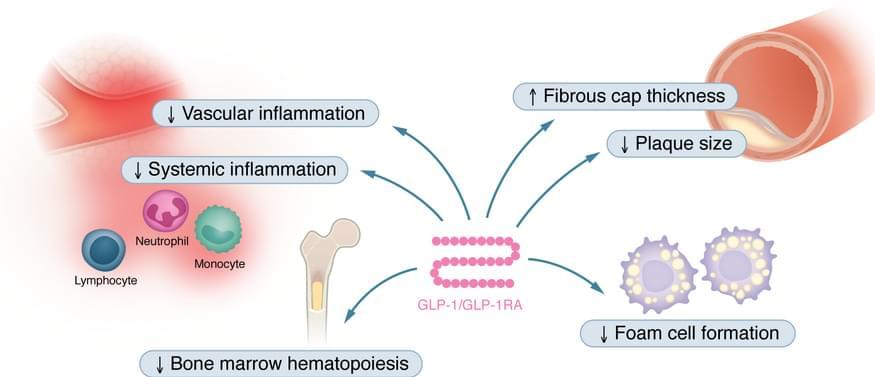Age-related changes in protein tagging and degradation may help explain how the brain declines over time and why diet can still influence these processes.



As part of JCI’s Review Series on Clinical Innovation and Scientific Progress in GLP-1 Medicine Florian Kahles, Andreas L. Birkenfeld, & Nikolaus Marx summarize the effects of GLP-1 and GLP-1RAs in the cardiovascular system as well as clinical data of GLP-1RAs in individuals with cardiovascular disease or in those at high risk.
1Department of Internal Medicine I, University Hospital Aachen, RWTH Aachen, Aachen, Germany.
2German Center for Diabetes Research (DZD), Neuherberg, Germany.
3Department of Internal Medicine IV, Diabetology, Endocrinology and Nephrology, Eberhard-Karls University Tübingen, Tübingen, Germany.

An international team of astronomers has performed multi-wavelength observations of the nearby Araish galaxy to investigate the origin of its radio emission. As a result, they detected an extended radio jet of this galaxy. The finding was reported February 11 on the arXiv pre-print server.
Observations show that powerful radio jets are commonly observed in elliptical galaxies or massive quasars. However, their presence in spiral galaxies is relatively rare. These systems, known as spiral double radio-source associated with galactic nuclei (DRAGNs), are therefore unique galaxies where classical disk morphology coexists with large-scale radio jets.

Chikungunya virus, a debilitating tropical disease caused by infected mosquito bites, poses a greater health threat in Europe than previously thought because it can be spread when air temperatures are as low as 13°C. Researchers at the UK Center for Ecology & Hydrology investigated the ability of the Asian tiger mosquito to spread the virus, which is rarely fatal but can cause long-term chronic joint pain.
They drew up a map showing the extent of the risk of chikungunya for 10 km-square areas across Europe including the U.K. The risk map shows the threat of virus transmission may last several months of the year in warmer parts of the continent where the tiger mosquito is already established. The research is published in the Journal of the Royal Society Interface.
There were record numbers of local outbreaks of chikungunya in France and Italy in 2025, and the tiger mosquito has also been responsible for increasing numbers of cases of dengue fever in these countries in recent years. This mosquito species is only occasionally detected in south-east England and is not yet established, so the current risk of local transmission in the U.K. remains very low.

Many of the latest large language models (LLMs) are designed to remember details from past conversations or store user profiles, enabling these models to personalize responses. But researchers from MIT and Penn State University found that, over long conversations, such personalization features often increase the likelihood an LLM will become overly agreeable or begin mirroring the individual’s point of view.
This phenomenon, known as sycophancy, can prevent a model from telling a user they are wrong, eroding the accuracy of the LLM’s responses. In addition, LLMs that mirror someone’s political beliefs or worldview can foster misinformation and distort a user’s perception of reality.
Unlike many past sycophancy studies that evaluate prompts in a lab setting without context, the MIT researchers collected two weeks of conversation data from humans who interacted with a real LLM during their daily lives. They studied two settings: agreeableness in personal advice and mirroring of user beliefs in political explanations.

“EE is a disabling form of reflex epilepsy with heterogeneous clinical, EEG and neuroimaging features, which are not necessarily substrate-specific. Findings from our study point to the presence of a wide epileptogenic network prominently involving perisylvian regions. Treatment outcomes in drug-refractory EE remain suboptimal, and further studies are needed for a better understanding and management of this complex entity.”
Read this original article from Epileptic Disorders at doi.org/10.1002/epd2.70132.
Objectives To evaluate the clinical, electroencephalographic (EEG), neuroimaging characteristics, and treatment outcomes of patients diagnosed with eating epilepsy (EE). Methods This retrospective study was conducted at a tertiary care epilepsy referral center in India. Patients diagnosed with EE between 2002 and 2025, with at least one EEG and magnetic resonance imaging (MRI) available for review, were consecutively included. Clinical data and multimodal evaluation findings including video EEG, brain MRI, positron emission tomography-MRI (PET-MRI), and magnetoencephalography (MEG) were systematically collected using a structured proforma. Seizure outcomes and treatment strategies were subsequently analyzed.

A traditional Chinese mind-body practice that combines slow, structured movement, deep breathing and meditative focus lowered blood pressure as effectively as brisk walking in a large randomized clinical trial published in JACC. Blood pressure reductions were seen after three months and sustained for one year.
High blood pressure is one of the leading preventable risk factors for heart disease. Clinical guidelines recommend regular physical activity, yet long-term adherence to exercise programs is challenging for many people, particularly when routines require equipment, dedicated space, gym memberships or ongoing supervision.
Baduanjin is a widely practiced, standardized eight-movement sequence that integrates aerobic, isometric, flexibility and mind–body components. Practiced for centuries and commonly performed in community settings across China, the routine typically takes 10–15 minutes and requires no equipment and only minimal initial instruction, allowing it to be performed in a wide range of settings. Because it is low-to moderate-intensity, it is considered safe and accessible for many adults.

New in practicalRO.
Axillary substructures may contribute to the development of breast cancer-related lymphedema (BCRL). This study aimed to compare dose-volume parameters of various substructures to identify high-risk regions associated with BCRL and to evaluate the clinical applicability of these findings.

The brain’s ability to do everything from forming memories to coordinating movement relies on its cells producing the right proteins at the right time. But directly measuring this protein production, known as translation, across different types of brain cells has been a challenge.
Now, scientists at University of California School of Medicine, Scripps Research and their colleagues have developed a technology that reveals which proteins are generated by individual brain cells. The team used their method—called Ribo-STAMP—to create the first maps of protein production across nearly 20,000 individual cells in the mouse hippocampus, a brain region essential for learning and memory.
The study was published in Nature.

Kumar et al. identify a metabolically controlled trait of CD4+ T cells in autoimmune disease. Exposed to fatty acids in rheumatoid joints, they form lipid droplets containing pore-forming gasdermin D and its activator zDHHC5. These droplets induce plasma membrane lysis, resulting in the leakage of intracellular contents and tissue inflammation.